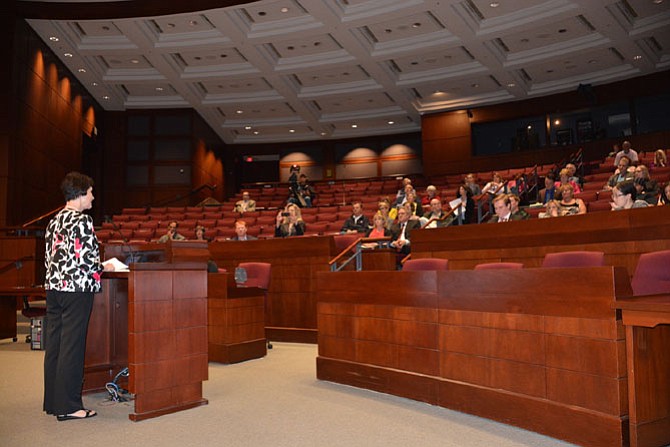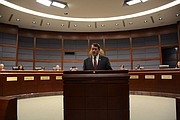Fairfax County Board of Supervisors Chairman Sharon Bulova (left) addresses the individuals gathered at the May 3 Heroin and Prescription Drug Abuse Town Hall meeting. Photo by Tim Peterson.
South Lakes High School and George Mason University graduate Ginny Lovitt lost her brother Chris to a heroin overdose. He was 21 and had been discharged from the Sagebrush Treatment Center of Northern Virginia just a week before, in January of 2013. His tolerance was down.
Though he had been struggling with the disease of addiction since he was 15, Lovitt said he also suffered from the stigma and isolation of being an addict.
“He wasn’t a bad person, he was a sick person,” Lovitt said at a May 3 Town Hall meeting on heroin and drug abuse at the Fairfax County Government Center. “He couldn’t get fully connected to this recovery community.”
Immediately following his death, Lovitt and her parents established the Chris Atwood Foundation to help raise awareness of opiate addiction, eliminate the stigma and teach individuals how to administer doses of Naxloxone, a drug that can reverse an overdose within 30 to 45 seconds.
Lovitt joined a panel of elected officials, law enforcement and treatment service leaders who spoke on the growing public health crisis at local, state and national levels: heroin and prescription drug abuse and subsequent overdose.
The Town Hall was hosted by Supervisor Pat Herrity (R-Springfield) who opened the evening speaking about unreported overdose deaths in his district he had learned about. By shining a light on the disease of addiction and promoting the resources available to people in Fairfax County, Herrity explained, people facing challenges with prescription opioid drugs and or heroin can “get help for yourself and loved ones.”
Rep. Barbara Comstock (R-10) followed Herrity, citing the eye-popping statistic that overdose deaths eclipse deaths from car accidents in Virginia, with 728 in the last year.
“Like Pat, in the past few years, I’ve seen this throughout our community,” Comstock said. She called for attacking the problem “on all fronts,” at the local, state and national level, and stressed the need for more drug treatment facilities and education about addiction.
“We need a whole community of support,” she said, “and want families to come out of the shadows and see there are others like them.”
Recognizing existing recovery resources and communities was one of the evening’s themes, after making the connection from initial addiction to prescription pain medication like Oxycontin leading to increased tolerance and risk for overdose, and or switching to much cheaper heroin, which can also result in overdose.
Del. Tim Hugo (R-40) spoke about the Virginia General Assembly favoring special drug courts for younger, nonviolent offenders that would offer them alternatives to incarceration. “You should not necessarily be a convict,” Hugo said, “you’re a kid with a problem.”
Fairfax County Board of Supervisors Chairman Sharon Bulova said she was “astounded” that “we’re seeing so much of this every day.”
Bulova went on to paint the severity of problem in Fairfax County with numerous statistics, including from 2012 to 2014, there were 141 deaths from overdose, versus 79 car crashes over the same period. Also, Bulova said, the Fairfax County Fire & Rescue Department responded to
291 suspected heroin overdoses between 2011 and 2014.
“Mostly this is a human problem,” she said. “It damages our own lives and own potential.”
Lieutenant James Cox with the Fairfax County Police Department shared an anecdote of a couple in Reston that were shooting heroin together in a vehicle in the park. Because of the purity of the drug, the husband experienced an overdose. The wife took the needle directly from his arm and injected into her own. The two of them fell out of the vehicle, both overdosed. Someone reported them, thinking it was a double homicide. When first responders were able to reverse the wife’s condition, Cox said, “she tried to fight them for robbing her of her high.”
Cox’s narrative illustrated a pair clearly in need of help. Representatives Lyn Tomlinson and Wanda Orr from the Fairfax-Falls Church Community Services Board explained how treatment and resources are more accessible for people than ever, including nine-to-five walk-in assessments and treatment commencement at the Merrifield Center at 8221 Willow Oaks Corporate Drive in Fairfax.
Nick Yacoub, a peer support specialist supervisor and senior recovery coach with Substance Abuse Addiction and Recovery (SAARA), reminded everyone that help is out there, and that no one is alone in their addiction or recovery.
“No one wants to live with this, terrified and in pain” said Yacoub, himself an addict who has been in recovery more than eight years. “Getting arrested saved my life, recovery made it a life worth living.”
The Town Hall was streamed live through the Fairfax County Website but will be rebroadcast later this month on Channel 16. For more information, visit www.fairfaxcounty.gov/csb/heroin-opiates.
Since October 2015, the Fairfax-Falls Church Community Services Board has been offering “Revive!” training courses to the public for how to administer nasal spray and direct injection drugs that can help reverse the effects of an overdose.

